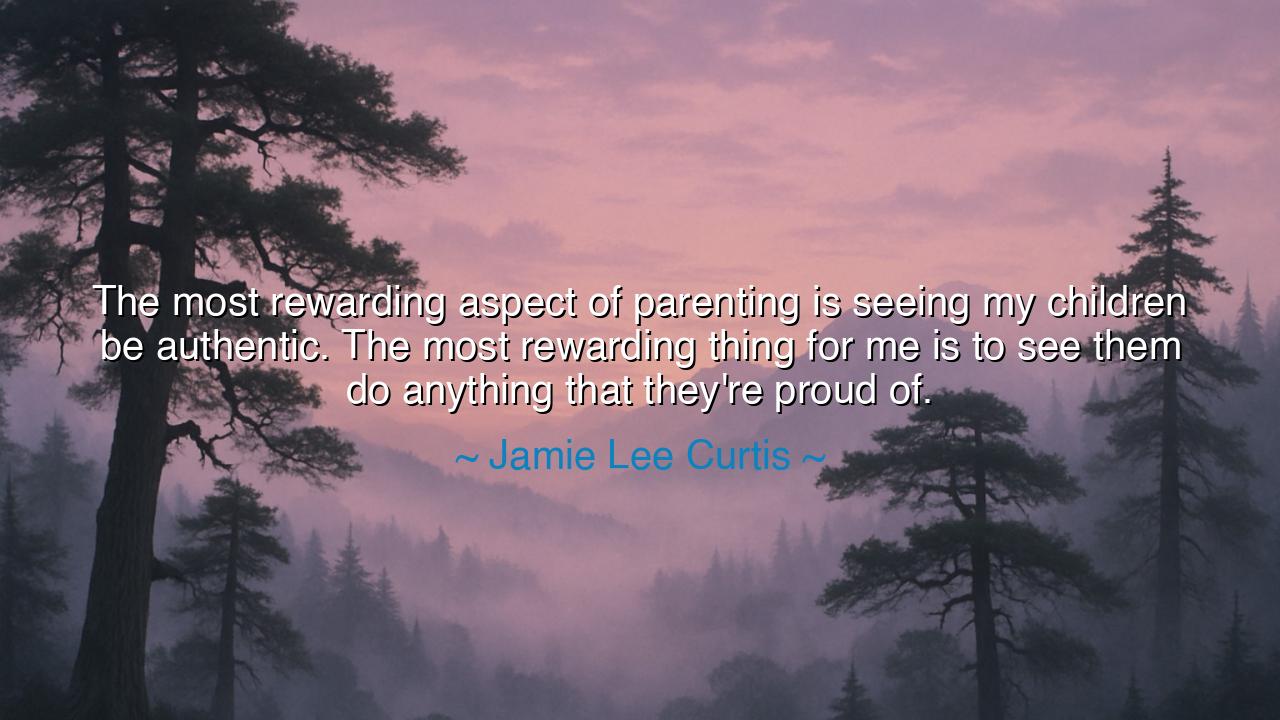
The most rewarding aspect of parenting is seeing my children be
The most rewarding aspect of parenting is seeing my children be authentic. The most rewarding thing for me is to see them do anything that they're proud of.






In the words of Jamie Lee Curtis, there is a revelation that cuts to the heart of the human journey: “The most rewarding aspect of parenting is seeing my children be authentic. The most rewarding thing for me is to see them do anything that they’re proud of.” These words hold within them the eternal truth that the highest joy of a parent is not in riches, not in obedience, not even in worldly success, but in witnessing the flowering of a child’s true self. To be authentic is to live without mask or fear, to act from the soul rather than for the approval of others. And to see a child act in such freedom is to taste the deepest fruit of love’s labor.
The ancients long spoke of authenticity, though in their own language. The Greeks called it areté, the excellence of being true to one’s own nature. The Stoics taught that each being has its proper essence, and happiness lies in living according to it. To force a child into falsehood—whether through fear, pride, or the crushing weight of expectation—is to betray the very soul entrusted to the parent. Curtis’s words remind us that parenting is not the art of molding children into our own image, but the sacred act of freeing them to become what they already are.
History provides luminous examples. Consider the story of Mahatma Gandhi and his son Harilal. Gandhi, a man of great vision and discipline, tried to impose his exacting ideals upon his son. Harilal, unable to bear the burden of such rigid expectation, stumbled into failure and despair. Gandhi’s greatness to the world was immense, but to his child, the weight of imposed ideals crushed authenticity. Contrast this with the story of Johann Sebastian Bach, whose children grew into accomplished musicians in their own right, nurtured not by the demand to repeat their father’s genius, but by the freedom to express their own voices within the tradition he passed on. In this comparison, we see the joy Curtis speaks of: not in control, but in authenticity.
Curtis also reveals the nature of pride as seen through a parent’s eyes. A child’s pride is not in grand accomplishments alone, but in any act where they feel the glow of having done something truly their own—whether it is a drawing, a kind word, a courageous stand, or a melody played with trembling hands. When a parent sees this spark of self-born pride, they witness the child stepping into their own being. This moment is more rewarding than trophies or honors, for it is the victory of the soul over doubt.
The meaning of her reflection is deeply emotional, for it reframes the goal of parenting. Too often parents measure success by comparison—whose child is smarter, stronger, more accomplished. Yet Curtis tells us that the real measure lies not in comparison but in authenticity. A child who is proud of themselves, even in small acts, is richer than one who achieves greatness for the sake of pleasing others. The parent who understands this sees not the world’s reflection, but the child’s true light.
The lesson for us is clear. First, let us value authenticity over conformity, encouraging children to listen to their inner voice rather than the noise of the crowd. Second, let us celebrate their efforts, not merely their results, so they may learn to take pride in themselves rather than in the approval of others. Third, let us check our own ambitions, ensuring that we do not live through our children, but allow them to live through themselves. For our task is not to make them mirrors, but to give them wings.
O seekers of wisdom, remember this: the true reward of parenting is not to raise children who shine for us, but children who shine for themselves. The parent who delights in authenticity plants seeds of courage that will endure through generations. Love that liberates is stronger than love that controls, for it builds human beings who can walk tall in their own truth.
Thus, Jamie Lee Curtis’s words endure as a beacon for all parents. To see a child proud of their own actions, to see them live authentically, is to know that love has done its work. This is the greatest reward of all: not that we shape them into what we desire, but that we stand in awe as they become who they are meant to be.






AAdministratorAdministrator
Welcome, honored guests. Please leave a comment, we will respond soon